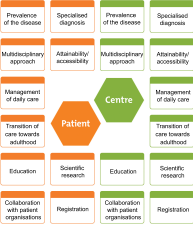Introduction:
Patients with rare diseases often have to endure a late diagnosis, a lack of knowledge among specialists and healthcare workers, a lack of effective treatments, and insufficient attention to scientific research. To provide proper care, it is important to cluster expertise for these diseases. This insight has led to the formation of centres of expertise and also leads to developments at European level, like the establishment of European Reference Networks (ERN). In the process of identifying and designating expertise in rare diseases at national level, hospitals and healthcare workers generally indicate their expertise. The perception of patients is often not incorporated, while they are experts by experience and therefore should be involved in this process. The goal of the project ‘Expertise Mapped’ is to visualise the organisation of care for patients with rare diseases, from patients’ perspective.
Method:
The knowledge maps are based on the EUCERD Quality Criteria for Centres of Expertise for Rare Diseases, summarized in ten topics. The process of making a knowledge map consists of three steps:
- First the perceptions, needs, wishes and experiences of patients are gathered by an online survey.
- A panel of patients visits the centre(s) of expertise from patients’ perspective. They interview the experts and identify the competences of the centre(s) and the organisation of care.
- All the information of step 1 and step 2 is taken together in a knowledge map.
If there are more centres of expertise for one rare disease, each centre will get their own knowledge map.
Click on the image for full size
Results:
At this time there are knowledge maps in The Netherlands for 15 different rare diseases and 27 centres of expertise. These knowledge maps have been produced in the last 3 years. In the next 3 years we will continue producing knowledge maps with the intention to generate a large and diverse overview of rare diseases and their centres of expertise. At the end of the coming 3 years there should be over 50 knowledge maps in the Netherlands. They are published online on www.expertiseinkaart.nl/kenniskaarten.
Discussion:
Patients with rare diseases often experience a lack of knowledge among specialists and healthcare workers, which leads them into a maze of different healthcare professionals without proper coordination. These common problems experienced by patients with different rare diseases and the developments at the European level (forming of ERNs) have led to the start of the project ‘Expertise Mapped’.
In this project different patient organisations for rare diseases collaborate, as they stand stronger together. ‘Expertise Mapped’ strengthens the position of patient(s organisations) by bundling and showing the expertise for different rare diseases from the patients’ perspective. Also all the information gained from the online surveys will be analysed on a aggregated level and contribute to the mapping of collective interests for all rare diseases. Distinctive characteristics and similarities will be identified, which allows patients organisations to unite and advocate the needs of patients with rare diseases. The more knowledge maps will be published, the stronger the patients' voice.
Conclusions:
It is important to confirm centres of expertise for rare diseases from patients’ perspective and to visualise the organisation of care. ‘Expertise Mapped’ provides patients, patient organisations and healthcare workers more insight in the organisation of care, and an overview of the expertise for rare diseases from patients’ perspective. Knowledge maps have many advantages:
- Knowledge maps show where expertise is located and how patients care is organised;
- If there are more centres for the same disease, knowledge maps give patients the opportunity to choose what fits their needs;
- The online survey provides insight into patients’ perspective on proper care and their actual care needs;
- Knowledge maps give centres of expertise the opportunity to show their expertise.



